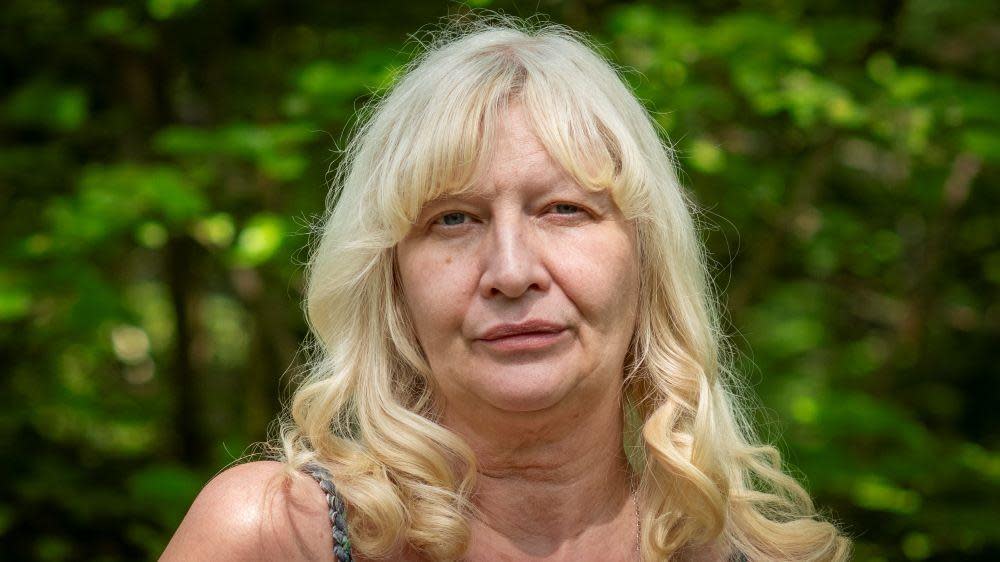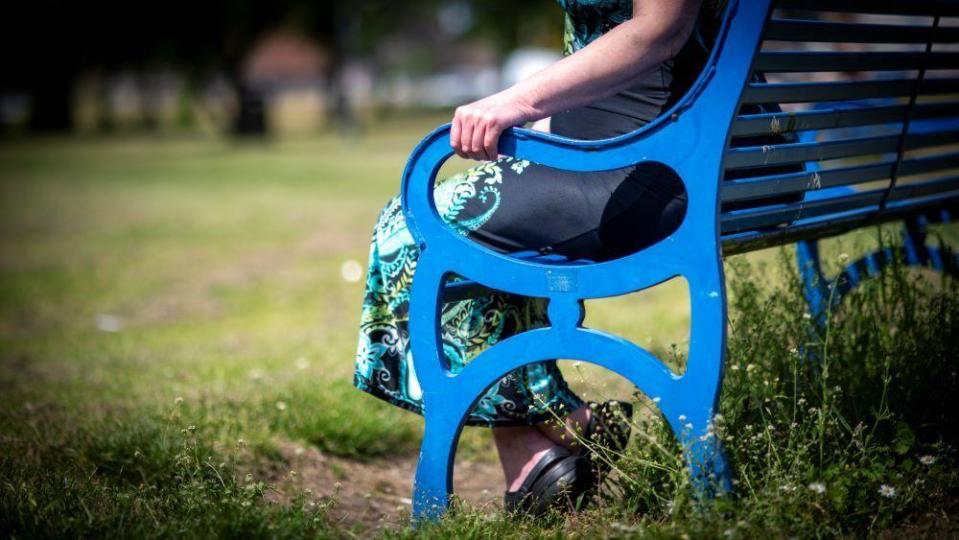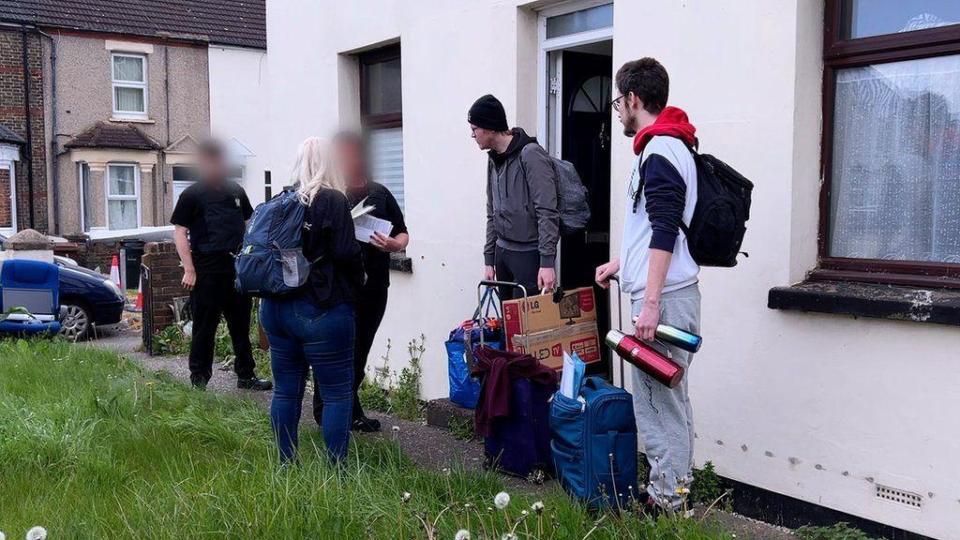Evicted grandmother now sleeping rough in park

When Heidi Dodson discovered she was going to be evicted, she reached out to her local council of Thurrock in Essex for help. But it rejected her application for priority housing and said she would cope if she ended up on the streets. Two weeks after being evicted, Heidi is homeless and sleeping in a park.
Every evening Heidi Dodson reads her grandchildren a bedtime story and wishes them good night.
Then she quietly packs a rucksack with a torch, biscuits and some toilet roll, and makes a flask of tea, before making her way to a local park to spend the night.
“You think about what you had - the safety of your own home, key, roof over your head,” Heidi says. “It’s these things that are going through your mind when you are out in the cold and sleeping on a park bench.”
The 57-year-old former shop assistant was recently served a section 21 “no-fault” eviction after seven years living in a private rented property she had secured through the council.
Heidi was turned down for priority housing by the local housing department and told that even if she had to “sleep rough occasionally or in the longer term", she would not be more vulnerable than anyone else in the same situation. The council has since apologised for the wording of the letter and says it is supporting her to find a suitable home.

After the bailiffs arrived at her rental flat, Heidi presented herself as homeless at the council’s offices. She says she was sent away with a list of private landlords, none of whom would accept a tenant on housing benefit.
She ended up at her daughter’s, but the two-bedroom flat is already overcrowded with two adults and two children, plus Heidi’s adult son who was made homeless alongside her.
With the mother-daughter relationship strained through lack of space, Heidi decided it was better to remove herself from the situation, even though her daughter urged her not to sleep outdoors.
At the park overnight, Heidi sits on a park bench resting her head on her hand, holding tightly on to her rucksack under a zipped-up coat and wearing two pairs of leggings.
She typically gets about three hours of fitful sleep in this position before having to walk around to keep warm.
The physical impact on her has been swift. Exhaustion has set in, and her hair has started falling out from stress.
"My hips and knees are killing me from the cold,” Heidi says. “I’m not young any more.”

Personal safety is a constant worry. When men proposition her or people throw insults, Heidi pretends she is waiting for a friend to finish their night shift, even staging fake phone calls from them.
“People shout at me, ‘Are you touting for business? How much do you charge?’," she says.
Heidi has turned down an offer of a tent and a sleeping bag from a local outreach charity, because she fears these would make her more of a target.
“If you’re in a sleeping bag, how are you going to run? If I’ve got someone attacking me I’ve got to try and unzip it. Would I get away or would I be beaten to a pulp?” she says. “I’m thinking of all those scenarios while I’m sleeping there.”
It is 40 years since Heidi last slept rough in her late teens, because of difficult family circumstances.
In-between, she has had three children and many jobs, including as a cleaner, barmaid, receptionist, waitress, carer and childminder. Her most recent job, working in men’s formalwear at House of Fraser, ended when the branch closed in 2020.
Mentally adjusting to being back on the streets is really challenging.
“I never thought I would be sleeping rough again - it’s a shock to the system,” she says. “The other night I had a good cry. I feel guilty if I show that emotion in front of my daughter and son because we’re in a difficult enough situation as it is, so out here I can just let it out.”
She is trying to adjust to the practicalities of sleeping in the park where there are no toilets.
“I probably last about four hours before I need to go,” Heidi explains. “I think, ‘OK, there’s no-one around.' and I go down that way, shine my torch to make sure there’s nothing there. It’s degrading.”

In the mornings, Heidi returns to the flat to shower, warm up, and have some breakfast while her daughter is taking the children to school, and then tries to get some sleep.
With about £10 left in her bank account she is now struggling to afford the bus fare to go to local food banks on which she has started to rely.
At the end of the month, Heidi will receive her £270 in benefits and her new reality is dictating how she spends that money.
“I’m sitting here thinking, ‘Is this going to be my life now?'. OK, right, when I get my money I have got to invest in long sweatshirts and thermals. I’m already catering for a life out here.”
As of March 2023, the number of people on the waiting list for social housing in England stood at nearly 1.3 million, the highest since 2014.
Meanwhile, the number of no-fault evictions by bailiffs, where landlords can ask someone to leave their property without having to give a reason, rose by 49% last year compared with 2022.
Thurrock Council told the BBC that it has nearly 5,000 people on its waiting list for housing. It says many local authorities across the country are struggling, as demand for housing outstrips supply. It said it is continuing to work with Heidi “to help her find a way out of this difficult situation”.
“We are supporting her to find a suitable home, and we have offered advice about her rights and the financial support available,” it said.
Polly Neate, from Shelter, told the BBC that with private rents the highest on record and few genuinely affordable social homes available, her organisation is seeing more and more people like Heidi “tipped into homelessness every day”.
“Sleeping rough is deeply unsafe, with people under the constant threat of harassment and violence. It can also lead to a rapid deterioration in people’s health due to the combination of extreme stress, being out in the elements and not being able to eat, sleep or access toilets and showers easily,” she said.
Heidi can now apply to rent other council properties, but is in a low priority band. The council will also partly fund a deposit for a private rental - but she says that these properties will probably be snapped up by other tenants faster than the council can authorise the money for her.
In the meantime, she hopes to secure temporary housing which will give her a bit of stability and security - and then start looking for something more permanent.
"I just want peace of mind,” Heidi says. “My own key, my own roof, my own home.”
Photography by Phil Coomes

